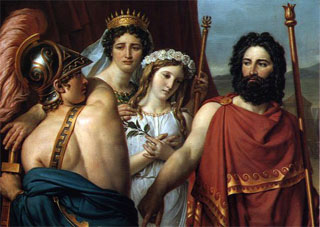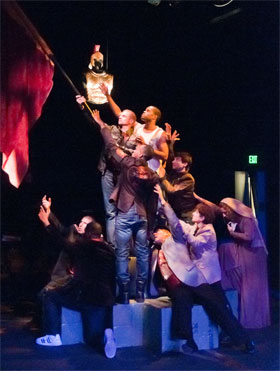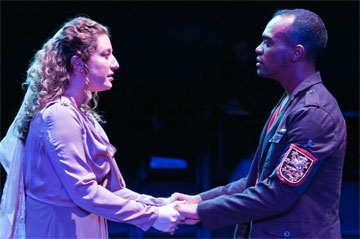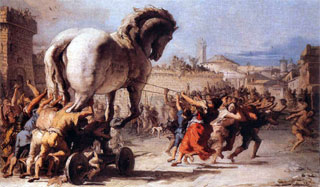Play by William Shakespeare
Directed by Tina Packer
The Modern Theatre at Suffolk University
Boston, MA
With Allyn Burrows (Prologue), Maurice Emmanuel Parent (Troilus), Robert Walsh (Pandarus/Agamemnon), Steven James DeMarco (Aeneas/Menelaus/Boy/Servant), Brooke Hardman (Cressida), Paige Clark (Alexandra), Johnnie McQuarley (Ajax/Paris), Michael Forden Walker (Thersites), Bobbie Steinbach (Nestor/Priam), Craig Mathers (Ulysses), De’Lon Grant (Achilles), Danny Bryck (Patroclus/Diomedes), Ross MacDonald (Hector/Calchas), Paige Clark (Cassandra/Helen/Andromache)

Courtesy of Kimbell Art Museum, Fort Worth, TX
In the latter years of the Trojan War, there is dissension in the Greek ranks. Apparently, Achilles, though a great warrior, is spreading bad blood and making life difficult for Agamemnon and the Greek commanders. Ulysses, ever wily, proposes something be done to shake up the Greek army from its indolence. As it happens, Hector, the great hero of the Trojans, sends a challenge to the Greeks to set two chosen individuals from each side into combat with one another. Ulysses seizes on the opportunity to suggest that Ajax, Achilles’ rival and an unexpected choice, be the one to face Hector.
Meanwhile, Troilus, a Trojan prince, falls in love with Cressida, daughter of the Trojan traitor Calchas who has flown to the Greek side. She hesitantly but gradually returns his love, egged on by the manipulative Pandarus. But Cressida, it turns out, is to be bartered to the Greek side as part of the general negotiations about the ensuing combat. No Juliet, Cressida does not exactly rise to the occasion and a great deal of disappointment ensues.

Troilus and Cressida has been traditionally regarded as one of Shakespeare’s more problematic plays, and one can certainly see why. It includes a tragic love story, but one whose tragedy is ultimately unsatisfying. It is also a war story, but does not include a focal character who brings the action into dramatic focus. So, there is both dramatic deflation, and an amorphousness that does not create the sort of crises that great Shakespearean tragedies do.
But, in this excellent rendition directed by the great Tina Packer and executed by the wonderful Actors’ Shakespeare Project, the play comes off as well as it possibly might.
Part of the ingenuity of this production is in conceiving Pandarus as a shyster whose manipulative doings give rise to the tragic love story. In Robert Walsh’s fabulously lowbrow interpretation, Pandarus becomes a kind of small-time mobster whose crass dealings play upon the vulnerable Cressida and lead the romance towards its fulfillment, and then to its destruction.

and Maurice Emmanuel Parent as Troilus
Photo by Stratton McCrady
Two characterological parallels become obvious in this production: that between Pandarus, as the small-time manipulator, and Ulysses as the public and civic one. How easy it is to see the machinations of the little crook for what they are, and yet not see those of the guide of state affairs as much the same. In this production, the pathetic and the heroic vividly echo their varied forms of manipulation with one another.
As well, Pandarus and Thersites (Robert Forden Walker) echo in their lowbrowness. But despite his comical rundownness, Thersites offers sarcasm as a vehicle for social conscience. His willingness to ridicule and cast aspersions is born of a sense of idealism that is betrayed from without, while Pandarus’ sarcasm is born of his own betrayal of idealism from within.
Packer has given this play great dimension, humor and texture. She also has brought great insight to the development of Cressida who, given the context of the situation, does not merely play along as a hapless lover, but tries to gauge her own power based on the gestures of those around her.

by Giovanni Domenico Tiepolo
Courtesy of The National Gallery, London
Packer wonderfully developed a philosophy of Shakespeare’s evolving depiction of women’s self-awareness in her masterful Women of Will. Here, the renderings of that exploration are obvious, and make a great deal of sense to the trajectory of the drama.
As well, she shows that Troilus and Cressida is a hybrid of several Shakespearean idioms: tragedy, war story and pantomime. An atypical landscape of ironic humor surrounds the tragedy and the war story, which makes it seem odd, and may be what has given most fuel to its critics. But, in Packer’s deft hands, it all seems to make sense, but only in the expanded hybrid of idioms woven by her.
Robert Walsh (Pandarus) and Robert Forden Walker (Thersites), long time members of the company, stand out in their poignantly hysterical roles here. And it is a pleasure to see the incredibly versatile Bobbie Steinbach in two older male roles. She is also a long-standing member of the company and has played everything across the board with consistently satisfying results.
– BADMan
Leave a Reply